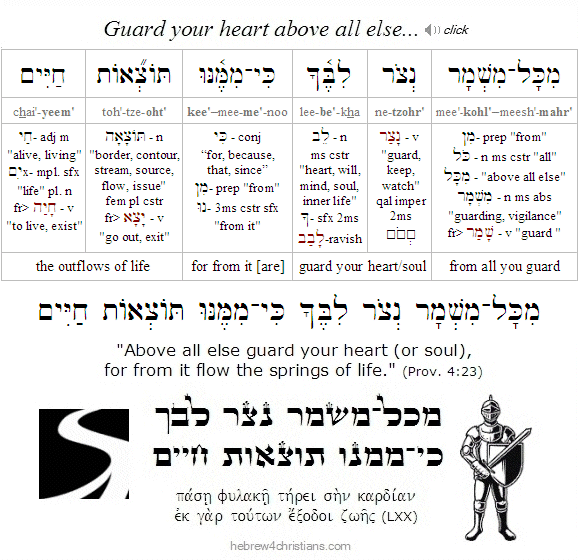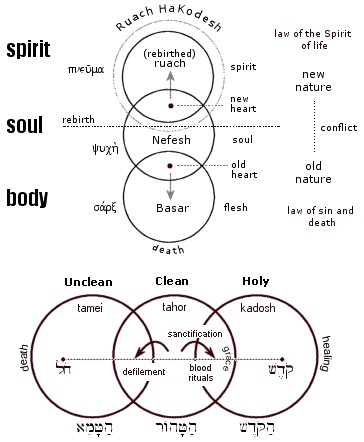|
All life flows from the heart, whether it is physical life or spiritual life. And just as the physical heart supplies life-giving blood through the arteries to the various organs of the body, so our faith, or the spiritual heart (i.e., lev ruchani: לב רוחני), supplies the means of life and grace to the organs of the spirit. And just as the physical heart can be obstructed or blocked, so faith can become constricted and hindered by sin, impeding the free flow of the Divine Presence. Therefore since the heart represents the "engine" that sustains life, it is vital that we attend to the heart's needs in order to be healthy people...
מִכָּל־מִשְׁמָר נְצר לִבֶּךָ
כִּי־מִמֶּנּוּ תּוֹצְאוֹת חַיִּים
mee·kol - meesh·mar · ne·tzor · lee·be'·kha,
kee · mee·me'·noo · to·tze·oht · cha·yeem'

"Above all else guard your heart,
for from it flow the springs of life."
(Prov. 4:23)
Hebrew Study Card


Notice that the word mishmar (מִשְׁמָר) refers to the act of guarding someone closely, just as an prison guard or warden might keep watch over a prisoner. The phrase translated "with all diligence" (mikkol-mishmar) literally means "more than anything that might be guarded," and is used here to intensify the command to exercise vigilance. Plainly put, this verse commands us to watch over our heart more than anything else.
And yet "the whole head is sick, and the whole heart faint" (Isa. 1:5). We understand how apt we are to go astray in our affections, and therefore the heart is easily divided, obstructed, and liable to failure... Despite its frailty, however, the heart determines totze'ot chayim, or the "springs" or "contours" of life. In the Tanakh, the word totza'ot is often used to refer to the borders of territories or the boundaries of a city. This verse is saying that from the heart of a person (lev) a "map" or "chart" to life is drawn. As the heart is either pure or corrupt, so will be the course of one's life... Purity of heart represents healing, which means being single-minded in our affections and attention before the LORD.
How you choose to guard your heart from inner corruption and hardness will determine the "road" of your life. Concerning this verse the Metzudos commentary says, "Above all – more than anything else – a person must be careful to guard his heart from improper thoughts, for one cannot contemplate using the heart – the very vortex of life – to harbor thoughts that are inimical to life." Because the flesh is weak, we must be vigilant lest we become cynical, weary, and unfeelingly selfish. An unguarded heart soon becomes troubled, lonely, suspicious, and unstable. If, however, we keep ourselves from the obstruction of sin, we will experience the free flow of compassion, encouragement, and joy. The faithful heart is open - it believes all things, hopes all things, and endures all things (1 Cor. 13:7).
It is your personal responsibility to guard your heart from negative influences -- a duty that is connected with yielding yourself as a vessel or "steward" of the kingdom of God. We must regularly ask God to enlighten "the eyes of the heart" according to His wisdom and power (i.e., truth revealed in Scripture), and to impart the power of the Holy Spirit to transform our desires and affections so that they conform to the character of the Messiah. In this connection, note the correspondence between the Tabernacle (or Temple) and the regenerated human being. Just as there are three realms within the Mishkan - the realm of the unclean (tamei), clean (tahor), and the holy (kadosh), so there are there realms of the human being: the realm of the flesh (basar), the soul (nefesh), and the spirit (ruach):
 |
The great vision of the Sanctuary - the climax of Sinai - revealed that faith in the efficacy of a blood sacrifice was the means by which a person could draw near to God. Just as the physical heart is central to distribution of blood - and the "life is in the blood" - so faith in God's vicarious atonement leads to life and healing. In this regard, the altar represents the heart, and we must carefully guard the innermost place, the holy of holies, that is within us. It was the heart of God that offered up Yeshua as our means of eternal atonement...
On the other hand, unbelief leads to defilement (or pollution), which is the natural process of degradation that alienates the soul from the Divine Presence. In other words, the flow of the Spirit may be obstructed because of sin. If we trust in ourselves, if we rely on our own abilities to obtain spiritual life and healing, we deny the need to draw near to God for salvation, and thereby we deceive ourselves. After all, the heart's so-called "truth" may indeed express little more than a fool's dream, as it is written, "Whoever trusts in his own heart is a fool (כְּסִיל), but he who walks in wisdom will be delivered."
בּוֹטֵחַ בְּלִבּוֹ הוּא כְסִיל
וְהוֹלֵךְ בְּחָכְמָה הוּא יִמָּלֵט
bo·te'·ach · be·lee·bo · hoo · khe·seel
ve·ho·lekh · be·choch·mah · hoo · yeem·ma·leit

"Whoever trusts in his own heart is a fool,
but he who walks in wisdom will be delivered"
(Prov. 28:16)

Notice that the fool retains the deluded perspective that the heart (or intuition) can "trump" revelation of the Scriptures, and spiritually-speaking that is a very dangerous place to be. In other words, this proverb warns us against a "false subjectivity," or self-deception. The heart must be carefully "guarded" because it constantly seeks to stray away from God and lapse into self-centered idolatry. As the Scriptures attest: "The heart is deceitful above all things, and desperately sick; who can understand it?" (Jer. 17:9).
We must never rely our own heart or intuition, which is often prone to self-justification, delusion, wishful thinking, and so on, but must instead trust the heart of God as revealed in the message of Yeshua the Messiah, the Savior who literally broke His heart for our deliverance. By itself - apart from radical intervention from heaven - the human condition is marked by self-deception, indulgence, and willful ignorance. Hence we see so-called Christian people endorsing fornication, winking at various forms of sexual sin, espousing contentious heresies, promoting apostasy, etc. Regarding unregenerate human nature, then, the Scriptures attest that the "thoughts and imaginations of the thoughts of the heart are only evil and that continually" since the "flesh" is perpetually at war with the spirit (Rom. 8:7; Gal. 5:17). "For out of the heart come evil thoughts, murder, adultery, sexual immorality, theft, false witness, slander" (Matt. 15:19). All our so-called good deeds are "niddah" before heaven – they are as "filthy rags" that signify death.
The one who walks wisely – with chochmah (חָכְמָה) – will heed the truth of the Scriptures, seeking the Lord and his counsellors, and trusting in God's Spirit to deliver his soul from the snares of death -- even from the concealed snares lurking within his own carnal heart. Not by might, nor by power, but by the Spirit of the Living God is the heart guarded... Amen - let it be true of us, chaverim, in the Name of the Holy One of Israel.
|






